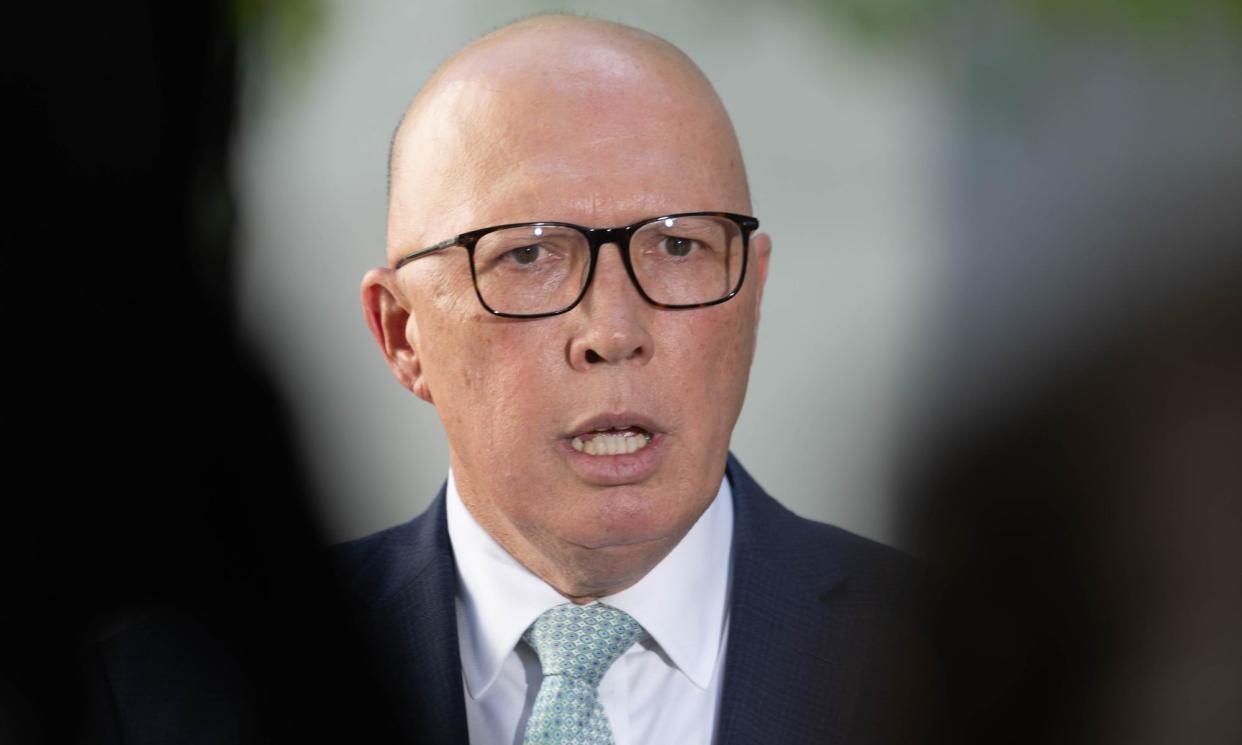Peter Dutton’s migration cuts would cost budget $34bn over coming decades, thinktank calculates

Peter Dutton’s cuts to migration over four years would cause a $34bn hit to the federal budget over coming decades, an independent thinktank has said.
The Grattan Institute estimate backs the treasurer Jim Chalmers’ statement that Dutton’s proposed migration cuts would cost “billions”, which the opposition leader dismissed on Monday as “voodoo economics”.
Last Tuesday Labor’s third budget projected net migration would fall from 528,000 last year to 395,000 this financial year, then 260,000 in 2024-25.
In his budget reply on Thursday, Dutton said the Coalition would cut permanent migration from 185,000 to 140,000 for the first two years, followed by 150,000 then 160,000 in the next two, a cumulative reduction of 150,000 over four years.
The Coalition has since clarified this would be accompanied by a target of 160,000 for net migration, a policy it claims would be achieved by international student caps, which Labor has already promised to enact, and fee hikes on international students.
Trent Wiltshire, the deputy director of migration and labour markets at the Grattan Institute, told Guardian Australia that, although reducing the permanent skilled intake would not have a big impact in the short term, the longer term benefit of skilled migration was “huge”, including migrants improving Australia’s productivity, filling skills shortages and paying more taxes.
Based on Dutton’s claim on Monday that two-thirds of the permanent intake would be via skilled visas, Wiltshire estimated that over the forward estimates (to 2027-28) the long-term cost to government budgets would be $34bn over those migrants’ lifetimes in Australia.
The Grattan Institute also estimates that every 100,000 more people in Australia pushes up rents by 1%, which the Coalition has cited to support its claim tackling migration could help housing affordability.
On Monday Dutton rejected Chalmers’ claim that migration cuts would cost billions. In 2018 the then treasurer, Scott Morrison, made the same argument about the cost of cutting migration when Tony Abbott called for deeper cuts. At the time Dutton supported Morrison’s position.
“If the treasurer is saying that the economy can only function with migration numbers at an historic high, and that the price of that is people not being able to find a home, then I don’t sign up to Jim Chalmers’ form of voodoo economics,” Dutton told reporters on Monday.
“I believe very strongly that there is enormous economic growth in what we’ve proposed, because Australians are much wealthier if they’re able to buy their own home and see the price of that home appreciate over time.”
The shadow home affairs minister, James Paterson, has said the Coalition is “strongly supportive” of migration and rejected claims that the opposition was seeking to weaponise the hot-button issue.
“How could it possibly be the case that the Labor Party reducing migration is fine, but the Liberal Party reducing migration by a little bit more is somehow terrible?” he said.
Earlier Anthony Albanese accused Dutton of having “a vibe, not a policy” on migration.
“And with like all of the so-called announcements that he’s made, when you look at the detail, it simply isn’t there,” the prime minister told ABC Radio. “No costings, no understanding about impact on the economy.
“James Paterson was on radio on ABC indeed this morning again saying, they just wanted to cut it just a little bit.
“You’ve had the leader of the National party saying that whilst they wanted to cut education places, none of them would be cut from the regions. So, it’s not clear exactly how that happens either.”

 Yahoo News
Yahoo News 
